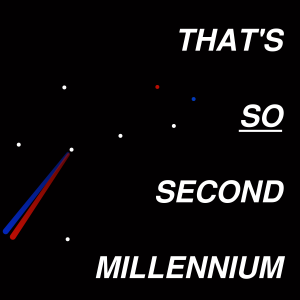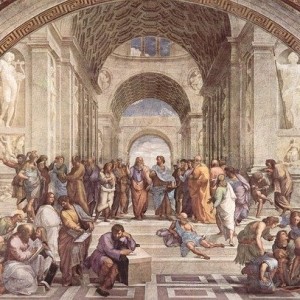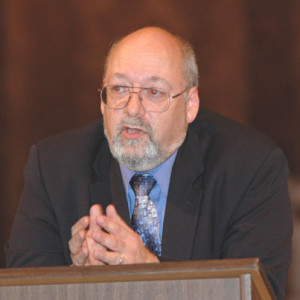Episodes

Monday Feb 08, 2021
Episode 119 - Evolution in Christianity and Geology (rerun)
Monday Feb 08, 2021
Monday Feb 08, 2021
A rerun of Episode 6.
Do not blame Morgan for the sound quality of this episode! All complaints should be directed to Paul at the email link at https://www.thatssosecondmillennium.net.
Bill and I hope to be back in action soon.

Wednesday Jan 27, 2021
Episode 118 - "I Know What You're Thinking"
Wednesday Jan 27, 2021
Wednesday Jan 27, 2021
- Paul and Bill talk here about a mix of psychology and societal dilemmas in light of Catholic values.
- Twelve-step programs have experience with an interpersonal phenomenon often called “taking someone else’s inventory,” Paul points out. This entails one individual assessing another through a facile psychological analysis of supposed characteristics underlying comments made or behavior shown; it can be prone toward unfortunate intimations of contempt, based on emotional reaction. This has gotten worse in these days of snap judgments which assume the worst, not the best, about complex people in complex situations.
- Often, people fail to make a distinction between the actions and the basic characteristics of a person. Paul mentions The Betrothed, a novel which talks about circumstances where different sorts of reactions to evil actions were possible, for good or ill.
- The film Rudy includes a conversation where one hears the aphorism, “I’ve learned there is a God, and I’m not Him,” Bill mentions. The twelve-step programs have recognized that it is an awful prospect to have to play the role of God without having the abilities of that Higher Power, as Paul points out.
- Subsidiarity as a centerpiece of Catholic Social Thought makes sense not only as an aid to effectiveness of solutions, but also an aid to greater peace of mind about one’s agency and responsibility in addressing problems, your co-hosts agreed.

Monday Jan 11, 2021
Episode 117 - Aida Ramos on Debt and Spending
Monday Jan 11, 2021
Monday Jan 11, 2021
- Aida Ramos, Ph.D., is an associate professor of economics at the University of Dallas. She returns to TSSM, in this episode recorded early in the week of January 4, 2021, to discuss Catholic perspectives on United States policy efforts to stimulate the economy.
- During the discussion, Bill recalled a class he took at the Princeton School of Public and International Affairs that outlined a rigorous process of federal budget management. It included multiple annual authorization and appropriations bills covering various agencies and governmental functions. He could not remember immediately the name or previous budget-leadership role of his professor from those years as a student, but he commented in general that, over time, the discipline planned for maintaining quality control over program specifics via this legislative routine gave way to habits of less regular and detailed Congressional oversight on specifics of spending.
- Ramos noted that the Citizens United case decided by the US Supreme Court in 2010 had a major effect on campaign finance which in turn greatly increased the influence of corporate lobbyists over Congressional decision-making and thereby contributed to changes in legislative practices regarding federal budget management. The multi-trillion-dollar spending bill passed by Congress in late 2020 offers examples of how management rigors, at least as they maintain a focus on common-good and fiscal-responsibility duties, changed in ways that lessened Congressional and White House priorities integrating social justice into year-end spending plans; concerns about the primacy of addressing broad, basic needs of the population, as described by goals of solidarity and subsidiarity in Catholic social thought, have not been served by enactment of policies like tax deductions for the so-called “three-martini lunch.” That policy, which economists judged to be primarily a benefit for the wealthy, favors spending practices seen in corporate and lobbying circles, Ramos said.
- The need for responsible approaches to economic management within government is an area of profound moral concern that has arisen consistently present and past policy-making. Different policy actions, including the Covid-19 relief legislation, which is separate from the aforementioned multi-agency spending bill, represent differing approaches to deficit spending in the federal budget. Deficit spending can be justified during an economic crisis if it is limited and focused fairly on necessary remedies and investments. But the US has run up deficits in various years when they were not necessary, and the national debt has exploded. The need to pay interest on the national debt to investors squeezes out spending that could go toward meeting urgent needs such as food and poverty relief in the general population. This again raises concerns through the lens of Catholic values about human dignity and the preferential option for the poor.
- The major tax cut passed during the Trump administration had components that added hugely, unnecessarily, and unfairly to the deficit, Prof. Ramos said. A morally informed discussion about taxation has to be conducted among Americans to help influence government decision-making in legislation like this.
- An absence of responsive and responsible fiscal policy, legislated by Congress, has required more action by the Federal Reserve in recent years, taking the form of quantitative easing. This is monetary policy, whose technicalities can stir misguided fears among people. One bottom line in the different forms of policy-making is the need to serve the common good and human dignity; actions which support the economic stability and participation of families and households at the local level are an example of the Catholic call to respect subsidiarity as a means toward solidarity, Prof. Ramos said.
- Pope Francis has been outspoken about the need for populations to respect Catholic social values like these in policies and relationships widely and consistently. Certain budgetary responses to Covid-19 relief for people are in keeping with the Pope’s call. The application of a moral lens to budget management that meets public needs is nothing new; indeed, the field of political economy arose out of moral philosophy, a connection personified by Adam Smith, according to Prof. Ramos.

Monday Dec 14, 2020
Episode 115 - Aida Ramos: How the Big Picture Sheds Light on Economics
Monday Dec 14, 2020
Monday Dec 14, 2020
- Our guest, economics professor Dr. Aida Ramos, returned for further conversation after Episode 114. She pointed to wisdom in papal encyclicals from the past that we still need to tap into today—for the sake of just and reasonable arrangements in society and the economy. The granddaddy of these encyclicals is Rerum Novarum, from Pope Leo XIII in 1891. Forty years later, Pope Pius XI issued Quadragesimo Anno.
- Words are important, we noted in our discussion. The root for the word subsidiarity, which is a key concept in Catholic Social Thought, comes from the Latin for assistance or help. The origins of the word economics trace back to the management of a household, which incorporated a sense of stewardship, seeking the good for all persons connected with a household.
- Ramos pointed out that the appeal of Catholic Social Thought is by no means limited to Catholics or the Church. This wisdom is compatible with a broader legacy of insights deep in the Western intellectual tradition. She discussed economic insights embodied in the Acts of Union of 1707 in Great Britain, as described in her book, Shifting Capital.
- Historical figures who helped to shape ideas of economic justice through their expertise and their advocacy regarding the Acts of Union included Sir James Stewart. Dr. Ramos also mentioned Adam Smith, the 18th century economist and moral philosopher whose book The Wealth of Nations argues for the wisdom of free market capitalism. Henry George, a 19th century economist, also contributed to the secular intellectual trends which ran counter to the individual-utility principles of today’s neoclassical economics.
- Echoes of the notions more inclined toward common-good thinking are expected to receive attention in a new introductory economics textbook now being written by development economist Jeffrey Sachs. This will integrate concepts of subsidiarity and common-good motivation, which have a long history in secular discussion and are outlined cogently in Catholic Social Thought.

Monday Nov 23, 2020
Episode 114 - Aida Ramos and A Church Where Economics Counts—For People
Monday Nov 23, 2020
Monday Nov 23, 2020
-
Paul and Bill spoke with Aida Ramos, Ph.D., an associate professor of economics at the University of Dallas. Prof. Ramos’ research and teaching at that private Catholic university include topics in economic development and Catholic Social Thought and their implications for public policy. She is the author of a book (Shifting Capital: Mercantilism and the Economics of the Act of Union of 1707 ) in the “Palgrave Studies in the History of Economic Thought” series.
-
The Vatican’s first direct foray into issues of justice in economics and the relationship of capital and labor came from Pope Leo XIII in 1891 in his encyclical Rerum Novarum. Pope Pius XI added to the Church’s economic analysis 40 years later in the encyclical Quadragesima Anno; it focuses on the different systems of economic organization. The Vatican has spoken out about economic organization and justice in various additional ways over the years, including such encyclicals as Saint Pope John Paul II’s Centesimus Annus. In general, both capitalism and socialism have received mixed reviews in terms of their virtues and problems.
-
At the core of economic decision-making—discernment about the systems from which we choose and how we implement them—is the balancing of rights and responsibilities. The Church strongly proclaims a variety of economic rights held by human persons. It also insists that humans and corporations go beyond a limited notion of responsibility focused only on maximization of income and wealth. The Church asks, what is the economy for? What is my duty to God and other human beings as it is to be exercised through human economic behavior?
-
The universal destination of goods is a Catholic principle that the reason the economy exists is for the good of all human persons. The preferential option for the poor is a principle which states: If any action makes the poor worse off, do not pursue it. The Church also teaches that we all have a responsibility to uphold the common good. The Catechism of the Catholic Church says, the totality of social and economic conditions is intended for human beings to achieve fulfillment and authentic happiness.
-
Pope Franics’ new encyclical, Fratelli Tutti, reminds the faithful to pursue fraternal relationships of compassion and love with people all over the world, which helps the human ecology to reflect and build the common good. This taps into principles of Catholic Social Teaching including solidarity and respect for the dignity of each unique individual created by God. This global consciousness coexists with a local consciousness guided by the principle of subsidiarity—which instructs that people at the level of smaller communities should have responsibility and authority to address all issues they can address, free of intervention by higher authorities unless those greater resources must be called upon.
-
Catholic Social Thought, or Catholic Social Teaching, has been called the Church’s best-kept secret, partly because its principles are prospective meeting grounds for broader public consensus; they are drawn from the Gospel and Church wisdom through the ages, but they have rarely been proclaimed as a package to be consistently understood, discussed and applied in unison.

Wednesday Oct 28, 2020
Episode 112 – A Happy Medium: By What Means?
Wednesday Oct 28, 2020
Wednesday Oct 28, 2020
-
Paul and Bill focused on the 2020 elections as a point of tragically little focus in discourse or reasoning—but a good starting point for wide-ranging conversation about humanity’s desperate search for balance, hope, and sustainability in our hearts and minds. The desire for a higher wisdom—a happy medium, a golden mean—has always been complicated by our focus on ourselves and our temptation to believe that we know best, the co-hosts pointed out. Bill pointed out that “fake news” was said to have made its first appearance in the Garden of Eden, courtesy of the serpent; that comment was made by Pope Francis in his 2018 reflections for World Communications Day.
-
Society is operating in a state of radical uncertainty and unsustainable indebtedness among persons, but we forget the stabilizing recognition that we share an indebtedness to God—a responsibility to Him as our source and our only reliable resource. We have forgotten a lot about this, leaving us not only lost, but facing a steep price to pay as God’s children, Paul said. He referred to the story of King Josiah’ realization that he and his people had strayed from the laws of the Torah.
-
People seeking personal goodness and the common good know we have made serious mistakes on our journeys and have perpetuated ignorance and poor judgment. Each successive generation has been left unprepared and unable to make difficult decisions that would point toward healing. Bill recalled G. K. Chesterton’s call for a nation’s responsibility to wisdom that whatever wisdom was being handed down via what he called “the democracy of the dead.”
-
But such respect for tradition is not one of humanity’s strong points. Paul pointed out that our podcast’s name points to a second millennium whose second half was marked by major departures from tradition for the sake of greater human creativity. The co-hosts discussed how any attainment of a golden mean has been lost in the pursuit of collaborative innovation—even though we fail to hone our ideas as humble learners and listeners. Meanwhile, any instinct to hold fast to the tried and true only traps us in cocoons of misguided, comfortable assumptions. The artificial “communities” we belong to through our digital culture are places not of roots which allow us to grow, but of simplified labels which mimic understanding, Bill said. He was drawing upon concerns about internet trends voiced by Pope Francis in his 2019 message for World Communications Day.
-
Our political system does not encourage any sustained, constructive dialogue between the old and the new or between fresh, authentic perspectives. Paul pointed out that we are not presented with real choices despite the fact that parties and partisans paint themselves as sharply different. And Bill pointed out that one are of common ground so many leaders share is the use of pessimism and fear. He recalled the presidential campaigns where candidate Biden spoke of a dark winter ahead and candidate Trump portrayed himself as the alternative to anarchy and economic despair.
-
When an incomplete knowledge of history leads to despair about the past and present of a society, it can seem like the structures undergirding that society are held up more by mass psychology than real accomplishments or aspirations, the co-hosts said. Our culture likes to exalt creativity in principle, but have we made it easier to see connectivity and possibilities, Paul asks. Bill, proving his fascination with papal teachings for World Communications Day, would point out that the 2020 message of Pope Francis highlights our need to pass along hopeful stories from generation to generation that begin with our dynamic, hopeful relationships with God. Paul reflected on how our childhoods do not always prepare us for the kinds of pursuits entailed in the career pursuits and panoramic interests of adulthood. In a world of limited, utilitarian perspectives, it is hard to find happy wanderers with big ideas looking for life’s happy mediums.

Monday Oct 12, 2020
Episode 111 - A Catholic Teacher – Dear Old Golden Rule Days
Monday Oct 12, 2020
Monday Oct 12, 2020
- Brad Stalcup joins Paul and Bill in this episode to talk about his recent entry into the world of Catholic education. He began teaching religion to high school freshmen and sophomores in this fall semester of 2020—a time that Paul describes as a “baptism of fire” because of Covid-19 and today’s unusual circumstances overall.
- The vast majority of the approximately 120 students in Brad’s various classes is learning in-person, but there are several who are “live-streamers,” participating in the courses through distance-learning. The school is located in the region around Cleveland, OH.
- It’s a labor of love, not overwhelming, and “I’ve got great students,” Brad says He has not surveyed the classes to find out which ones identify themselves as Catholic, but the vast majority are Catholic and probably 50 percent are practicing Catholics in the sense of weekly Mass attendance. There is definitely a Catholic identity in this high-powered school, “which I’m grateful for,” Brad says.
- There is an eagerness to learn, especially among the freshmen, he says. He recalls that his own freshman year was a bit of an iffy time, and he wanted to help young people not fall into the trap of a slow start in high school, perhaps accompanied by theological doubt. The bottom line for sophomores is that they try to predict and give the teacher the “right answer.”
- Two key messages to Brad’s approach to the freshmen: God does stuff. And your life matters. Because of scientific materialism, there’s a temptation to think life doesn’t matter because humans are actually reduced to a tiny bit of matter drifting through space. For the sophomores: God desires your happiness. And He invites you into relationship. Church only makes sense in the context of relationship, Brad points out. His principal goal is to rid them of “moralistic, therapeutic deism,” which already shows up in students’ papers—when they say, “God is there for you,” for example
- Brad says he likes using poetry, particularly “The Hound of Heaven.” It makes both of the two points he wants to focus on with freshmen. He adds that it’s important to present certain things as true while also leaving room for questions. Or else they will build a wall around their heart. Thomas Aquinas himself asked the question, “Does God exist?” so it’s a worthy question to think about. Ceasing to believe in God drives a wedge between science and God. Today’s focus on science is for things that happen on earth and God is for my spiritual fulfillment. When they start conflicting, our culture encourages scientistic This involves incorporating faith and reason together in a healthy way—leaving room for questions, having them think about life in non-scientific ways.
- Learning science involves asking questions just like learning religion. The tendency in students is to think they can memorize answers, in both, but there are more constructive ways to teach both.

Tuesday Sep 29, 2020
Episode 110 - To Solve Big Problems: Let’s Get Small!
Tuesday Sep 29, 2020
Tuesday Sep 29, 2020
-
In this episode, Paul and Bill are back together for a conversation that catches up on past episodes which pondered big problems in science, government, the economy, personal well-being, and more. The pondering focused on solutions as matters of step-by-step processes, but as our conversation starts, we’re feeling a bit overwhelmed by the enormity of the problems, their quantity and complexity. Society relies more and more on government, which has proven it does not perform long-term planning very well. And it doesn’t really have the needed resources and insights it claims to have.
-
Ultimately, the solutions are at the individual level and in communities and communion. Paul recommends Chesterton’s biography of St. Thomas Aquinas. The Church does have amazing resources for building up faith and hope in ourselves and others—with insights at the local and global level. Of course, the Church too is in a vulnerable and broken position in its circumstances as a human institution. Paul and Bill wonder how the Church can exercise influence in the nature of evangelization and civic duty at a time when the world needs better problem-solving that respects but transcends our various individual differences and weaknesses. Collectively, intellectuals are a tiny minority, and God must love rednecks (literally with red necks) because these are the working people. Here’s an inspiring story about rednecks. We must aim to do much of our work, with God’s help, in small steps and initiatives that growing corporations and growing empires of power will consider small and off-the-radar. The reference to “Let’s Get Small” looks to Steve Martin and an old “Saturday Night Live” performance in which he left a message that stuck with Bill.
-
A big part of the answer is Catholic Social Teaching. These principles can give us approaches and motivation and starting points for conversations about a sense of purpose to unite us. Again, it entails humility, not pontification, because at the individual level we need to act in our families and communities to get involved in bringing these principles to life—perhaps by going into politics, or getting involved in a civic organization, or simply accepting responsibility to assist some kind of repair work on one of society’s obvious wounds. This may involve joining groups, like the Knights of Columbus, to fight for many causes including racial justice. If we join the Democratic Party, our role would be to push for reform and renewal—but then again, the Lord would require us to do the same thing in the Republican Party.
-
Hilaire Belloc said the defining feature of the self-proclaimed “practical man” is his inability to reason back to first principles or forward to final consequences. Our politics are likewise defined by politicians thrashing about myopically trying to win individual elections. We need to provide our own grass-roots strength for each other, through solidarity, that gives us confidence to approach the public square with the particular abilities we may have to help. Often, this participation is best done at the local level, through family and community and small groups where we can make a distance and experience people’s needs, strengths, and dignity. This is the principle of subsidiarity.
-
Overall, the solutions and principles point us toward small, not huge solutions. Paul and Bill have talked in the past about how the fields of science and government, for instance, are hobbled in handing us solutions because there is little capacity for long-term planning or even long-term thinking at those grander scales. Many gaps appear in such an entrepreneurial macro-setting: Why did we fail to plan for this or that? Why did we not see this coming? We must be thinking small but thinking big. This is the economy of God and a strength of the Catholic Church, whose purview is local and global, individualistic and cosmic.

Monday Jun 08, 2020
Monday Jun 08, 2020
Bill interviewed a leading Catholic voice in public affairs, especially in bioethics and the culture of life: Richard Doerflinger.
- His latest column for Catholic News Service examines the implications of the “Science Wins” maxim publicized by Pfizer Inc. in a recent TV commercial. You can see the commercial here.
- Doerflinger mentioned libertarian bioethicist John Harris in connection with the developments and moral controversies surrounding research on embryonic stem cells some years ago. Once concerns about human dignity were successfully eased by the development of pluripotent cells, science and society both did win from a prudential pullback from reliance on embryonic cells.
- Phronesis is practical moral judgment that integrates human wisdom and prudence to make the best decisions possible on public policy and practice given the facts human beings know from science—in light of virtue as a crucial factor.
- In the Catholic journal First Things. James Hankins has written recently about Machiavelli as the political guru of his day, who introduced scientism as a values-free guideline for geopolitical strategy. Machiavelli’s own predictions about outcomes in the absence of moral judgments led to strategic failures rather than successes, Doerflinger pointed out.
- The only law of history is the law of unintended consequences, according to Niall Ferguson, famed analyst of history, economics, and science. Doerflinger commented that unintended negative consequences have indeed been known to result from cases where science was unleashed without the exercise of human prudence.
Photo credit: The Criterion (Indianapolis)

Monday May 11, 2020
Episode 101 - Pandemics as a Science Problem; Skepticism in a Diseased World
Monday May 11, 2020
Monday May 11, 2020
Part 2 of a three part conversation between Paul and Bill, where the main themes are skepticism, Catholic education, the mysterious absence of the Spanish Flu from our historical consciousness prior to 2020, and the philosophical conundrums of materialism, transgenderism, and scientism.
- Paul and Bill continued their conversation about skepticism toward science and religion. They touched on several examples of science failing to show that it “knows everything” or gets everything right. There must be a constant push for additional inquiry and knowledge. Bill said the teaching of religion in K-12 Catholic schools needs to express the hunger to learn more—the dynamic sense of joy in seeking God—just as the teaching of science sets an exciting stage for learning.
- The co-hosts discussed the lack of sure scientific knowledge about the COVID-19 pandemic. This led to references to the Spanish flu. Its history is poorly understood by most people, just as there was poor understanding in 1918 about the flu’s origins and impacts.
- Philosophy and natural science became unmoored from each other after the 17th century. Bertrand Russell appeared to share an opinion that Paul considers quite natural—the reluctance to accept that no philosophical inquiry into reality can be conducted without employing at least some original, foundational assumptions.
- Stephen Pinker acknowledges that materialistic thinking suffers from logical inconsistencies, Paul said. He referred to Pinker’s landmark book, The Blank Slate, an inquiry into the origins of human nature.
- Quantum physics, in its effort to explain how everything works by describing the behavior of atoms, is full of paradoxes, Paul said.
Image by Miroslava Chrienova from Pixabay

